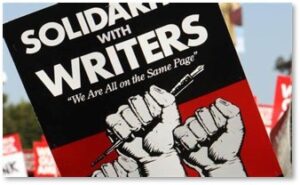If you follow the news, or if you’re wondering why late-night TV has gone to reruns, you know there’s a writers’ strike in Hollywood right now.
“On April 18, 2023, 97.85% of members of the Writers Guild of America (WGA) labor union of screenwriters in the United States voted to go on strike if they fail to reach a satisfactory agreement with the Alliance of Motion Picture and Television Producers (AMPTP), which represents the major film and television studios of Hollywood, by May 1.”
Two things drive this strike: the need to earn a good living from streaming TV and the imperative to be protected from the inroads of AI on the writing process. The writers seek, among other things, changes in pay and the formulas used to compensate writers when their work is streamed. They also want protection from AIs writing scripts. The WGA estimated its changes would cost about $429 million a year.
Opposing the Writers’ Strike
The studio executives need to protect a system that delivers huge profits to some of the movie-makers while skimping on compensation for the writers. Hollywood studios also have a profitability problem as they struggle to turn profits from streaming after spending billions in a race to add subscribers. Executives made that corporate decision and now want to maintain profitability on the backs of the writers.
 WGA statistics show that half of TV series writers now work at minimum salary levels. That’s up from a third in the 2013-14 season. Median pay for writers at the higher writer/producer level has fallen 4% during the last decade.
WGA statistics show that half of TV series writers now work at minimum salary levels. That’s up from a third in the 2013-14 season. Median pay for writers at the higher writer/producer level has fallen 4% during the last decade.
Just by comparison, here are the annual salaries of the media companies” CEOs:
- Netflix CEOs: $51M & $50M
- Nexstar CEO: $39M
- Warner Bros. Discovery CEO: $39M
- Comcast CEO: $32M
- Paramount CEO: $32M
- Walt Disney CEO : $24M
- AMC CEO: $24M
- Fox Corp CEO : $22M
One might think they really fight to protect their own wealth.
Many associated unions support the Writers’ Strike, among them the Directors Guild of America, acting union SAG-AFTRA, the Teamsters Union, and IATSE. That means their members won’t cross picket lines, which means no TV show or movie is going to get made until the strike ends.
The Importance of Writers
Actor, writer, and producer Josh Gad explained it best: “We are nothing without their words. We have nothing without them.”
Speaking as a writer, blogger, and published author, I couldn’t agree with him more. Fans attribute the words spoken in a movie or on a TV show to the actor or character who delivered them. But those words actually come from the minds of writers. The actor simply speaks them in front of the cameras.
- Famous lines in Casablanca like “We’ll always have Paris” and “Play it for me, Sam,” were written not by Humphrey Bogart or Ingrid Bergman but by Julius J. Epstein, Philip G. Epstein and Howard Koch.
 The AI might have said, “I can’t do that, Dave,” in 2001: a Space Odyssey but the line came from the pens of by human beings Stanley Kubrick and science-fiction writer Arthur C. Clarke.
The AI might have said, “I can’t do that, Dave,” in 2001: a Space Odyssey but the line came from the pens of by human beings Stanley Kubrick and science-fiction writer Arthur C. Clarke.- Clint Eastwood as Dirty Harry Callahan declared, “Go ahead, make my day,” but Joseph Stinson wrote the screenplay, along with a team of six other writers.
- Writer Aaron Sorkin put the words, “You can’t handle the truth,” on Tom Cruise’s lips in A Few Good Men.
- Although Marlon Brando as the Godfather said “I’m going to make him an offer he can’t refuse,” writers Maro Puzo and Francis Ford Coppola put that line in the script.
When he left New York City for Hollywood, Rod Serling explained the move by saying, “I can put words in the mouths of aliens that could never be spoke by Democrats and Republicans.” He knew the power of words and went on to create the Twilight Zone.
In the Writers’ Room
The writers are the men and women who sit alone in offices or toss ideas around in writers’ rooms—places where the big-name directors and A-List stars never go.
They drink gallons of coffee, eat tons of pizza and Chinese food. The writers may not see the light of day as they toss around ideas and struggle to create words that will be memorable. If they succeed, those words will forever be associated with someone else.
Now, the writers have gotten out of the rooms and onto the streets, walking picket lines in front of studios. Oscar-winning directors and writers have taken up signs and joined them on the picket lines. The writers know how big the stakes are for them because they have mortgages to pay, food to buy, and families to support. The studios measure their stakes in the millions.
But I love this quote from The Hollywood Reporter:
“The Shield put FX on the map,” wrote FX’s Snowfall writer and producer Sal Calleros. “Mad Men made AMC famous. House of Cards made Netflix famous. Writers have done that. Not just any CEO. Do you know what you get when you put CEOs on creative tracks? You get Quibi.”
So, buckle up fans. I don’t think this strike will end quickly. But its end will have consequences for us all.
NOTE: I wrote about the importance of the writers back in 2013
in a post called “It’s the Story, Stupid!”

